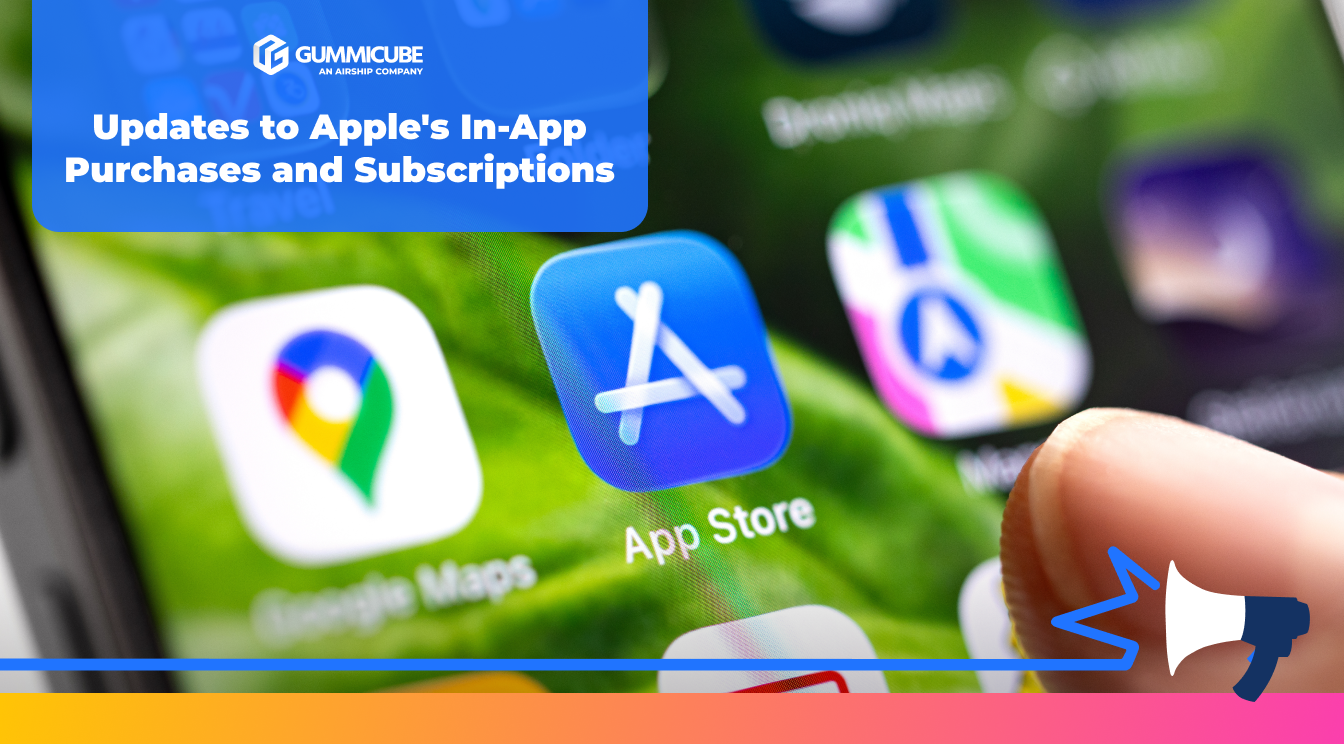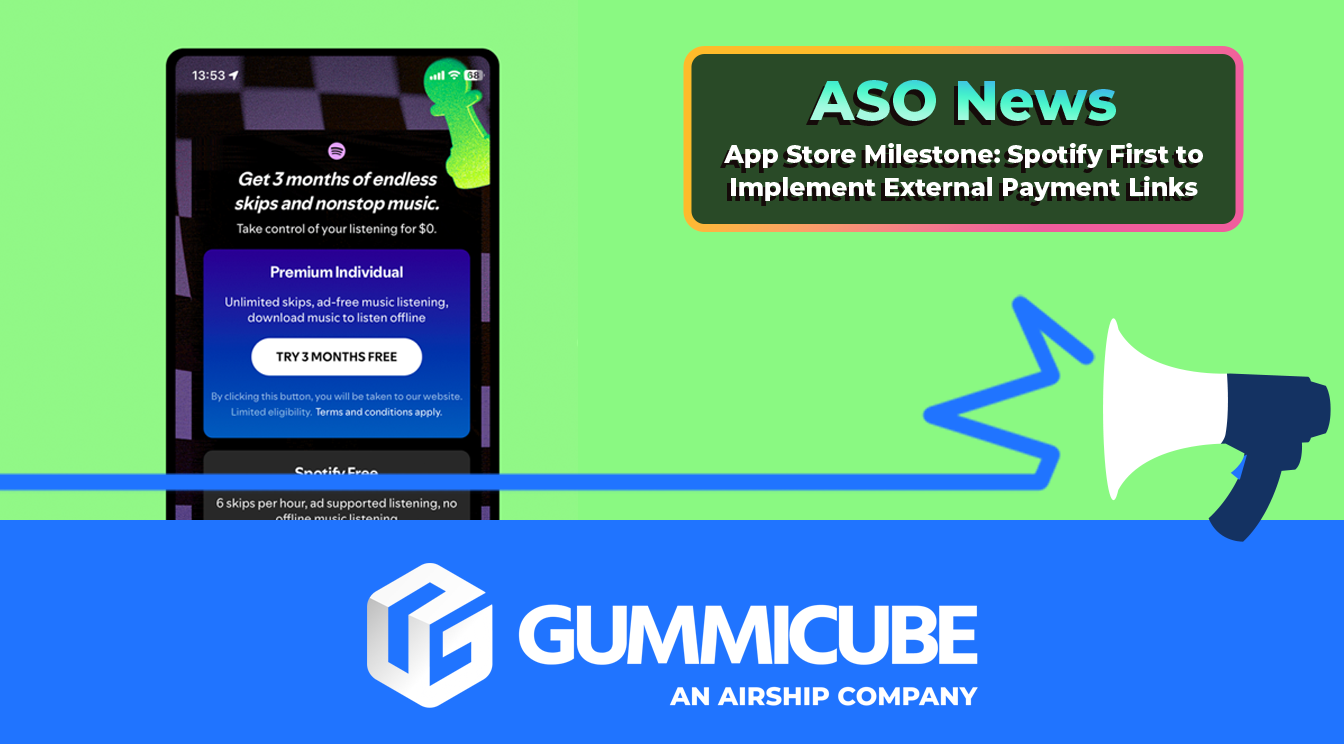
Updates To Apple In-App Purchases And Subscriptions
Posted on February 20th, 2026
Through A/B testing, keyword precision, creative differentiation, & regular refinement, teams can build durable visibility in an evolving marketplace.

Spotify has officially become the first app in the United States to offer external payment links, following an update approved by Apple. This move is more than just a win for Spotify, it’s a critical victory for developers seeking freedom from Apple’s payment policies. But this breakthrough is just the start of a larger transformation. As other apps adopt external payment options, developers will have to adapt quickly, and app store optimization (ASO) will become even more crucial.
For years, Apple’s in-app purchase (IAP) system has dominated the landscape of transactions within iOS apps, restricting developers to using Apple’s payment methods. This limited their ability to explore alternative revenue streams and often reduced their profit margins. Many developers have long argued that this system stifled competition and innovation. Now, with the recent changes, developers are beginning to see more flexibility, signaling the start of a new era in app monetization.
After nearly a decade of pushback and negotiations, Apple has approved an update to the Spotify app that lets users in the United States access external payment options directly within the app. This update was enabled by a legal injunction from Judge Yvonne Gonzalez Rogers, who ruled that Apple must allow external payment links in the U.S. App Store without charging commissions or limiting developer control over the placement, style, or flow of those links.
Spotify’s new app update goes beyond just adding a link. It provides users with clear pricing details, multiple subscription options, and the ability to choose payment methods beyond Apple’s system. This transparency and freedom are what developers have been fighting for, and Spotify’s success sets a precedent for others to follow.
But this change is not just about one app. It is a signal that the app store ecosystem is evolving, and developers who understand how to leverage this shift will have a competitive edge.
Spotify’s achievement is a direct result of a legal decision that redefines how developers can operate on the App Store. This isn’t just about gaining new payment options in-app, it’s about developers across the United States gaining new rights and freedoms. Specifically, in the United States App Store, Apple must not:
These rules are a direct response to years of legal battles and developer complaints about Apple’s restrictive practices. Now, developers can maintain greater control over their revenue models, explore new monetization strategies, and offer better value to their users.
Spotify’s ability to bypass Apple’s IAP system is more than just a victory for one app. It is a turning point for developers who have had to pay Apple a commission on their digital sales. This shift offers several immediate benefits:
This level of control is transformative for developers across multiple industries. Whether it’s streaming services, educational apps, eBook platforms, fitness apps, or gaming apps, developers can now design revenue strategies that align with their business goals.
Spotify may be the first to embrace the new external payment link options, but it certainly won’t be the last. As more apps adopt this change, the impact across different app categories will be far-reaching. The flexibility to offer external payment links opens up a wealth of new opportunities for developers in industries ranging from entertainment and fitness to digital content and gaming.
Subscription-based apps, such as those in entertainment or fitness, now have the chance to bypass Apple’s commission fees, offering lower prices or more competitive pricing models to users. This shift allows developers to explore alternative pricing structures without sacrificing revenue. Similarly, apps that sell digital content (whether books, music, or other media) now have the opportunity to offer direct purchases, keeping all the profits from their sales and potentially passing savings onto consumers.
Educational platforms, including learning apps and online courses, can bundle premium content through external payment links, increasing their revenue potential while giving users more flexible access to valuable resources. Likewise, gaming apps can now sell in-game items, currency, and premium features directly to users without having to give a portion of their earnings to Apple, thus boosting profitability and creating more opportunities for users to engage with premium offerings.
This change is more than just a trend, it’s a transformative shift that could significantly alter how apps across different industries operate. Developers who quickly adapt to this newfound freedom will be well-positioned to thrive, while those who hesitate risk missing out on valuable revenue opportunities.
Spotify’s breakthrough with external payment links is a clear reminder of why app store optimization (ASO) is an ongoing strategy. The App Store and Google Play Store are constantly evolving, with new rules, features, and opportunities appearing almost overnight. Developers who fail to keep up risk being left behind, while those who adapt quickly can gain a competitive edge.
This is why maintaining an active ASO strategy is essential. Developers who stay informed and adjust their app listings to match the latest guidelines are the ones who will thrive.
Spotify’s achievement is a defining moment for the App Store. By becoming the first app in the United States to implement external payment links, Spotify has set a precedent that will reshape how developers approach monetization. After years of debates and legal battles, developers now have an opportunity to bypass Apple’s commission structure, gain more control over their revenue, and offer users greater transparency.
This is not just an update, it is a turning point. Developers who embrace external payment options will gain an edge, while those who cling to outdated models may struggle to compete. But with this freedom comes responsibility. Developers must ensure secure, user-friendly payment flows and maintain compliance with App Store guidelines.
This change is just the beginning. As developers adopt external payments, the app store landscape will continue to evolve. Those who stay ahead of the curve will be best positioned to succeed.
Navigating the ever-changing App Store is challenging, but you don’t have to do it alone. Whether you are exploring external payment options, optimizing your app listing, or boosting conversions, Gummicube’s App Store Optimization services can help. Let’s connect and discuss how you can maximize your app’s success in this new era of the App Store.

Through A/B testing, keyword precision, creative differentiation, & regular refinement, teams can build durable visibility in an evolving marketplace.

Netflix’s mobile revamp is a strategic acknowledgment that user behavior has shifted toward social-first, vertically consumed, algorithmically surfaced content.

Apple’s upcoming Siri update, powered by Google’s Gemini AI model, represents a meaningful inflection point for the App Store ecosystem and ASO strategies.